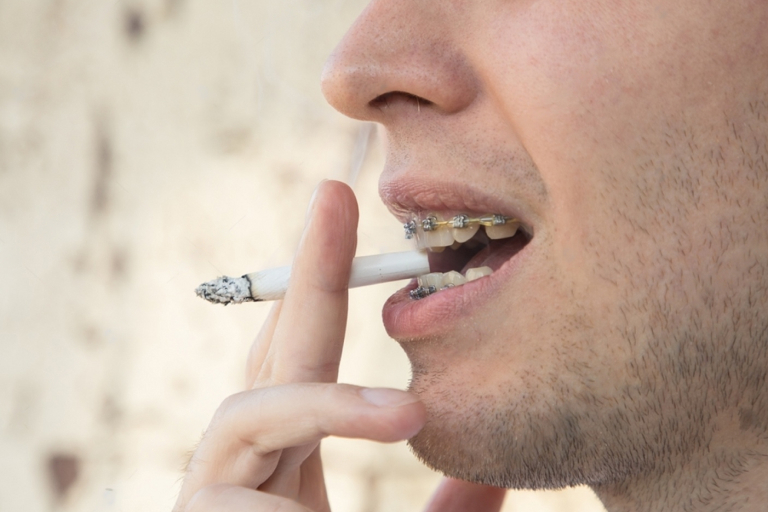
- Home
- About
- Our Team
- Services
- Postoperative Care
- Smile Gallery
- Medical Tourism
- Blog
- Offers
- Contact Us
- Home
- About
- Our Team
- Services
- Postoperative Care
- Smile Gallery
- Medical Tourism
- Blog
- Offers
- Contact Us

Orthodontic braces are a valuable tool for straightening teeth and promoting oral health. However, many patients may worry if smoking is acceptable while wearing braces. The impact of smoking on braces, as well as the possible health hazards linked with their combination, should be carefully evaluated.
In this blog, we’ll look at the risks and impacts of smoking while wearing braces and how smoking affects brace attachment, wire integrity, and general dental and gum health. We will also make advice on smoking cessation and alternate coping techniques for people who are presently smokers.
Braces are orthodontic devices that straighten and align teeth, enhancing both their look and function. They are made up of brackets cemented to the teeth and joined by wires. Braces use mild pressure to shift teeth into the correct position over time. This procedure corrects misalignments, spacing concerns, and bite disorders, hence improving dental health and smile beauty.
Braces are made up of brackets that are fixed to your teeth and wires that are adjusted on a regular basis to help your teeth align properly. These components generate tiny crevices and regions for plaque and food particles to collect. Proper dental hygiene is essential during orthodontic treatment to avoid cavities, gum disease, and discolouration of teeth surrounding brackets.
Smoking can degrade braces in a variety of ways, reducing their efficacy and perhaps increasing treatment duration. To begin, the chemicals in tobacco, notably nicotine, reduce blood flow and oxygen supply to the gums and bones that surround the teeth.
This reduced blood supply affects the body’s capacity to repair and rebuild bone tissue, which is required for the braces to function effectively. As a result, teeth may move more slowly or less reliably, lengthening the whole treatment time.
The heat from smoking may also degrade the glue that holds brackets on teeth, increasing the probability of brackets becoming loose or dislodged.
Here are several specific factors to consider about the impact of smoking while wearing braces:
Smoking, particularly cigarettes, can cause substantial tooth discoloration owing to the tar and nicotine included in tobacco. Braces can cause shadowing or uneven discolouration, making it more difficult to maintain a consistent appearance when they are removed.
Smoking lowers blood flow to the gums, limiting their capacity to fight infections and recover correctly. This can raise the risk of gum disease (gingivitis and periodontitis), which is especially troublesome when braces create new places for plaque and germs to accumulate.
Smoking might cause teeth to shift incorrectly during orthodontic treatment. Tobacco products include substances that might interfere with the bone remodeling process required for teeth to move into their proper locations, thereby increasing treatment duration or compromising the result.
Tobacco smoking can cause braces-related concerns, such as delayed healing of oral tissues following adjustments or increased gum and tooth sensitivity to wire pressure.
Smoking is connected to dry mouth, which lowers saliva production. Saliva helps neutralize acids in the mouth and remove food particles, which is essential for avoiding tooth decay and preserving oral health. This impact can be especially harmful when wearing braces, as cleanliness might be more difficult.
Smoking, in addition to staining the teeth, can have an effect on the look of orthodontic gear. Clear aligners, for example, might become discolored or stained throughout treatment, reducing their transparency and overall look.
If you wear braces and are thinking about smoking, you should carefully examine the dangers.
Consult an Orthodontist: Seek tailored advice on treatment and oral health.
Maintain oral hygiene: Brush after meals and floss daily to avoid plaque accumulation.
Monitor Staining: Monitor for discolouration and explore treatment options.
Quit smoking: Consider quitting to improve your oral health and well-being.
If you’re having trouble quitting smoking while wearing braces, try nicotine gum or patches to decrease your direct exposure to smoke. These solutions can still have an influence on dental health, although they may be less dangerous than smoking cigarettes.
While smoking is technically possible with braces, it is not recommended owing to the increased danger to your dental health. Orthodontic treatment is an essential decision to enhance your smile, and appropriate oral hygiene habits are crucial for effective results. If you have any concerns or questions regarding smoking and braces, see your orthodontist for personalized advice.
Taking good care of your teeth while wearing braces ensures that your smile makeover is both successful and healthful. Remember that your dental health is worth protecting and maintaining, both during and after orthodontic treatment.